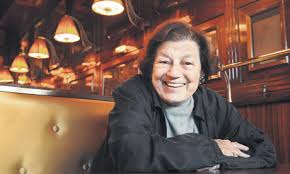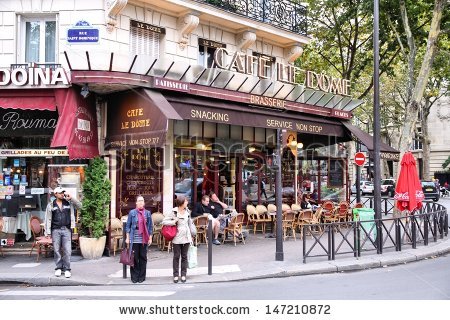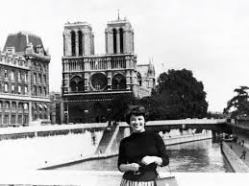It is hardly a tragedy when someone dies after a long, fulfilling life at the age of 91. But nonetheless, the thought that Mavis Gallant has passed away brings sadness, nevertheless. Though minus the high public profile of other celebrated Canadian women writers such as Alice Munro, Margaret Atwood and Margaret Laurence, all of whom she influenced, Gallant was one of our best. And she experienced so much — from reporting for the old Montreal Standard, jaunty beret in place, to the glamour of Paris, where she mentored the young, rambunctious Mordecai Richler then a fixture of the city’s brasseries, to her front-row seat during the fierce student uprising that virtually took over Paris during the summer of 1968, to her continued, meticulous writing that brought her the Governor General’s literary award in 1982, and made her a Companion of the Order of Canada 10 years later.
Yet Gallant was off the beaten track for many Canadians. In part, that was because she lived most of her life in dreamy Paris, so there was little national literary buzz about her. As well, her forté was the short story, which, Alice Munro notwithstanding, is not generally a road to fame. At her death, however, there was a flood of appreciation from writers and critics for her long writing career, not least of which from the none-too-shabby Michael Ondaatje. “I just adored her writing,” he told the Globe and Mail in an email. “Hers are the great stories of our time. So subtle, dangerous, hilarious. The full human condition. My hero.” American writer Joyce Carol Oates suggested the Nobel Prize awarded recently to Munro could easily have been shared by the two Canadian masters of the short story.
She wrote of outsiders, immigrants trying to cope and societal change. Many of her stories were set in Europe, but she was ever a Canadian, never losing touch with her home and native land. She often quoted with approval Robertson Davies’ succinct comment, during yet another Quebec referendum debate: “Canada is not a country you love. it’s a country you worry about.”
I can’t profess to having read oodles of her short stories, preferring the more accessible, crafted work of Alice Munro, but those I did read had a remarkable clarity and reality about them. And whenever she wrote about Paris in The New Yorker, I lapped it up. Gallant, who left Montreal to try and survive as a writer in Paris while still in her twenties, once said no other city appreciates writers quite as much as the City of Light. “I found for the first time in my life a society where you could say you’re a writer and not be asked for three months’ rent in advance.”
In 1990, I was lucky enough to spend a wonderful, magical afternoon with Mavis Gallant in the heart of her beloved Montparnasse. I was preparing a CBC radio documentary on “the changing face of Paris”, and Gallant agreed to be interviewed. When she suggested we meet on the outdoor terrace of the storied Dôme Café, one-time haunt of Hemingway, Capa, Picasso, Anaïs Nin et al, I was thrilled. Here was I, talking to a famous writer at Le Dôme! And Gallant loved to talk. She was a natural and easy conversationalist, without a trace of writerly airs, her lively mind darting from topic to topic. It was so much fun.
When news came of her death, I thought immediately of that grand day of long ago. After a surprisingly brief rummage through the legendary Mickle archives, I came up with the tape and gave it a listen on my ancient, wheezing tape deck. We sounded like old friends.
Gallant was surprisingly unsentimental about Paris, sharing none of my far-away romanticism for my favourite city in all the world. I kept trying to get her to agree with my thesis: wasn’t it a shame that Paris was losing its neighbourhood charms to fast food joints and garish modernity? She would have none of it. “I don’t like the bourgeois sentimental vision, that other people are supposed to live in slums because they’re attractive,” Gallant declared. “The picturesque slum is not my idea of how people ought to live. I think Paris has changed for the better.” However, she did profess a loathing for the notorious Tour Montparnasse, a garish black office tower plunked down in the middle of the low-rise arrondisement.
She also rebuffed my nostalgia for the good old days, honed by my long love affair with expatriate Paris of the 1920s, entranced by Hemingway’s fetching tales of how it was. “I don’t think Paris is being ruined,” said Gallant. “When I first came here, the city was rather dirty. You see the soft beige, sandstone colour on a lot of buildings? All that had been blackened by soot, since the turn of the century. Now it’s been cleaned, and the light is extraordinary.
“I have arguments with Canadians over this, because they like the grime,” she continued, over the café hum and clinking of cups and saucers. “But this is Paris as it was built. Suddenly we see those grand old buildings the way they were. That gives one much more a sense of history than a foot of grime.”
I finally hit the motherlode, when I asked her to describe the historic area where we were sitting, surrounded by other of the renowned cafès of Montparnasse. This was the clip I used for my documentary.
“Across the street, there’s been no change at all. That cinema has always been there. La Rotonde has always been there, of course. The Select has always been there. This café has always been here. Those two or three shops between here and La Coupole have always been there. The stationer, the tobacconist, that news agent across the street. They’ve always been there, too. So, you can’t say Paris has all been changed.”
Hearing those grand old cafés enumerated with such familiarity by Mavis Gallant, whilst gazing out at them from Le Dôme, itself, was a moment I’ve never forgotten.
RIP, Ms. Gallant. We’ll always have Paris.
http://article.wn.com/view/2014/02/18/Famed_Montrealborn_writer_
Sandra Martin’s elegant obituary in the Globe and Mail: http://www.theglobeandmail.com/arts/books-and-media/writer-mavis-gallant-dies-at-age-91/article16930775/#dashboard/follows/
And a recent Ideas segment on The Four Seasons of Mavis Gallant: http://www.cbc.ca/ideas/popupaudio.html?clipIds=2438015139



Oh, what a great last line, Rod….”we’ll always have Paris”. You sure can tell ’em! I enjoyed reading the whole thing, as Paris is also my favourite city in all the world. I envy your deeper familiarity with it and all the “fun” with Mavis Gallant. Great stuff.
o yay! thanks, cuz… 🙂